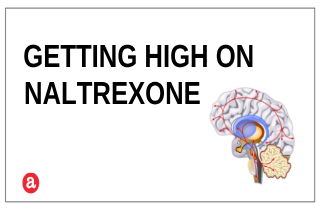No, you cannot get high on naltrexone. In fact, naltrexone is prescribed to treat opiate/opioid addiction and alcoholism by blocking the pleasurable and euphoric effects of these substances. It works by binding to opioid receptors in the central nervous system that these drugs normally occupy. When used in combination with psychotherapy, behavioral therapy, and support groups, naltrexone can help you get clean and sober.
So, how does naltrexone work in the brain? We explore here. Then, we invite your questions and comments in the section at the bottom of the page.
Naltrexone use and chemistry: What’s in naltrexone?
Naltrexone is an FDA approved prescription medication that helps people who are opioid-dependent or alcohol-dependent reach recovery goals and successfully maintain sobriety. In patients who take it for alcoholism, naltrexone works by blocking cravings, and thus significantly decreases the chances for relapse. When used by opioid or opiate addicts in recovery, it blocks the pleasurable and euphoric effects of the drug, even though it has a little to no effect on drug cravings. Further, naltrexone is the main active ingredient in the medications Revia and Depade, which are for oral consumption. It is also available in an injectable form, marketed under the brand name Vivitrol.
How does naltrexone work in the brain?
1. Naltrexone for Alcoholics
Naltrexone works in the treatment of alcoholism by blocking the brain’s chemical responses that make alcohol rewarding, and thus helps patients avoid drinking and stay sober. Alcohol stimulates the release of neurotransmitters in the brain, such as dopamine, serotonin, and opioid peptides. That’s why alcohol produces feelings of pleasure and well-being in those who consume it and become addicted to it. When naltrexone is prescribed, it helps alcoholics in recovery deal with cravings.
2. Naltrexone for Drug Addicts
Although naltrexone doesn’t significantly relieve opioid cravings, it can help people by blocking the euphoric effects drugs produce. It a medication used to treat opioid addiction that works by occupying the opioid receptors in the brain that are normally stimulated by drugs like heroin, oxycodone, or hydrocodone. Unlike other medications used in the addiction treatment, naltrexone does not have addictive properties, since it doesn’t produce a feeling of high.
Naltrexone effects on the central nervous system effects
Naltrexone is a pure opioid antagonist and binds mostly at the µ-opioid receptor. However, naltrexone also binds at k-opioid receptors and the d-opioid receptors. By binding to these receptors in the central nervous system (CNS), naltrexone reduces or completely blocks the subjective effects of alcohol and opioids.
Although scientists have confirmed that naltrexone blocks opioid effects and prevents alcohol cravings by binding to opioid receptors, the mechanism of action in alcoholism is still not completely understood. Still, naltrexone is known to be effective, since clinical studies have shown that it effectively reduces alcohol cravings and alcohol consumption in patients.
Mixing naltrexone with other substances
Individuals who are receiving naltrexone therapy should be aware that mixing it with other substances may change the way naltrexone works and increase the risk of adverse and unwanted reactions. Doctors should inform their patients about all possible drug interactions and side effects. Patients should also make sure their doctor is aware of all other prescription or illicit drugs they are using. Naltrexone may interact with the following substances (but this is not the full list):
- blood thinners
- cough medicines
- diarrhea medications
- narcotics or opioid analgesics (codeine, hydrocodone, tramadol, meptazinol, morphine, buprenorphine, dipipanone, diamorphine, methadone, oxycodone, pentazocine, pethidine)
Naltrexone for alcohol and opioid dependence treatment
Before you start naltrexone therapy, you should know that it is not a medication that will miraculously cure addiction. Medically assisted addiction treatment require the complementary help of a full treatment program that includes psychotherapy, behavioral therapy and/or support groups.
The initiation of naltrexone treatment is a decision that needs to be made by a doctor after a careful assessment of the patients health state. Naltrexone can help many patients, but some individuals may not be eligible for naltrexone treatment. In addition to this fact, there are certain risks and unwanted effects of naltrexone use that you should consider.
In order to help you make a decision to use naltrexone as a part of your recovery process, we compiled a list of the Pro’s and Con’s to using naltrexone for alcohol dependence treatment or opioid dependence treatment.
+ PRO’s
- efficiently reduces alcohol and drug consumption
- gives you time and opportunity to focus on treatment
- lowers the risk of relapse to alcohol or opioid drugs
- makes drugs and alcohol less desirable by blocking their pleasurable effects
- prevents alcoholics from experiencing alcohol craving
– CON’s
- may lead to unintentional and fatal opioid overdose (it blocks their effects)
- not safe for currently opiate dependent people (painkillers or illicit drugs)
- not recommended for pregnant or breastfeeding women
- possible liver damage if more than recommended dose is injected (for Vivitrol)
- unexpected side-effects
Questions about naltrexone
Quitting drinking and getting sober isn’t easy for people diagnosed with addiction or alcoholism. It requires determination and support. Staying sober is a long term process and involves therapy, dedication and significant changes in life.
If you or a loved one are facing a problem drinking or opioid abuse, naltrexone may be a medicine that can help you get and stay sober. Feel free to contact us through the comments section below and post any questions you have around naltrexone treatment. We appreciate your feedback and try to provide a personal and prompt response to all legitimate enquiries.









Related Posts